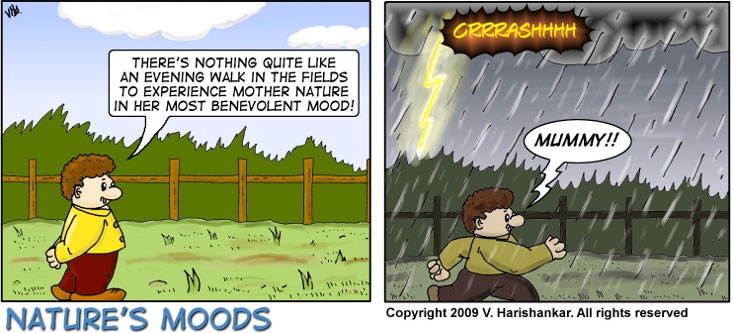Humour, comics, tech, law, software, reviews, essays, articles and HOWTOs intermingled with random philosophy now and then
Filed under:
Boxi and Panjo comic by
Hari
Posted on Wed, Oct 7, 2009 at 18:01 IST (last updated: Wed, Oct 7, 2009 @ 18:01 IST)

Since this doesn't feature Panjo, I thought I would start a sub-series entitled
Boxi's Asides. Hopefully these solo Boxi comics will live up to my expectations.
Filed under:
Boxi and Panjo comic by
Hari
Posted on Sat, Oct 3, 2009 at 19:26 IST (last updated: Sat, Oct 3, 2009 @ 19:26 IST)

Well, can you think of any more "euphemisms" of management speak? (Mind you, I don't intend to degrade vendors here!)
Filed under:
Software and Technology by
Hari
Posted on Thu, Oct 1, 2009 at 10:25 IST (last updated: Thu, Oct 1, 2009 @ 10:42 IST)
Personally I've been using Gnome for a while after being a KDE user for a period of almost 7 years. KDE has always been my first choice for a Linux desktop and while I have been extremely happy with it, I felt strongly that KDE was leaning towards the heavy side since the move to 4.x. While KDE fans might have a lot to rejoice over the extra eye-candy and features of the 4.x series, I did not find much to justify such a major overhaul which left plenty of useful KDE apps orphaned in the 3.5.x universe with no maintainers willing to take over and port them to 4.x.
I always felt that the choice of desktop was dictated more by the application usage than by the basic desktop features. After all, KDE and Gnome share a lot of common aspects of DEs like the Start menu, desktop wallpapers, multiple desktops, session management, power saving support and so on. My guess is that not too many users require much more precise control of the GUI than what Gnome offers. It's precisely for this reason that I didn't mind moving from KDE to Gnome.
Gnome while not as configurable as KDE still does the job pretty well. It's unfussy and feels much lighter than that super-heavyweight of X desktop environments. More than anything I found a whole host of Gnome/GTK applications that can adequately replaces their KDE counterparts.
Here's a small table, in no particular order, of Gnome/GTK replacements I've used since moving from KDE to Gnome.
On the other hand, my office suite continues to be the desktop-neutral OpenOffice, I still use GIMP for image processing and editing and of course, my web browser is Debian Iceweasel. The only KDE application for which I truly cannot find a good or even basic replacement is Rosegarden - the music composition tool.
You will also notice, from the above list, that I have a tendency to move away from desktop-specific applications and towards applications that are desktop-neutral (i.e. don't tie themselves down to a specific desktop's library). Applications which use the Qt or GTK kit directly get their thumbs up from me as they will obviously have fewer dependencies.
I don't mean to start a KDE vs Gnome debate here. The real issue is that I don't think the DE should matter so much. I'd gladly switch over to KDE again if I found a good reason to, but what I will do is continue to move towards desktop-neutral applications, so that in the end, the choice of DE is not of much consequence except eye-candy.
Filed under:
Boxi and Panjo comic by
Hari
Posted on Sun, Sep 20, 2009 at 14:56 IST (last updated: Wed, Oct 7, 2009 @ 18:02 IST)

This was an idea I got after the recent pilots' strike in Jet Airways, India's biggest private airline. Hope you enjoy it

By the way can any of my readers come up with a different script for the first panel? I'm interested in your ideas...
Filed under:
Software and Technology by
Hari
Posted on Thu, Sep 17, 2009 at 20:36 IST (last updated: Thu, Sep 17, 2009 @ 21:11 IST)
Can the GNU C compiler be used to compile code that is licensed under a proprietary software license?
This question arose in a somewhat roundabout manner in a thread in the
Debian user forums and the short answer is "Yes" as can be interpreted from this
GPL FAQ item (you should read the entire FAQ as it clears a lot of GPL myths, by the way).
The long answer?
In my book, compiled code or object code does NOT fall into the definition of a derivative work of the tool that does the transformation. Arguing otherwise is a logical and legal absurdity and is similar to claiming that the original artwork created or modified using a software tool like the GIMP ultimately belongs to the developers who created that tool and not the user who created the artwork. Compiling is mere transformation of high-level language syntax into machine code or pseudo machine code.
My humble opinion is that even if the GPL (or for that matter any other software license) did contain a clause restricted licensing of user compiled or generated code under any particular license I believe that such a clause would not stand the scrutiny of law or indeed the principles of natural justice in a modern society. It is my firm belief that third parties have absolutely no business dictating the license mechanism or business model of anybody else's work unless their own contribution in the creative process of the created work in question is direct and significant. Merely using a third party tool to apply transformation to an already created work cannot grant rights to the third party with regard to the product thus created. A carpenter's creation does not belong to the manufacturer of the chisel or the saw or indeed the supplier of the wood. Similarly a programmer's code cannot belong either to the creators of the programming language or to the creators of the tools that transforms the code into an executable object.
The corollary is that while nobody can force you to license your own code under any particular license, they CAN legally prohibit you from using their code in your creations/programs, either in modified or unmodified form.
The GPL license makes this very clear. You have two choices in that case: either release your own software under a GPL-compatible license or stop using the GPL code.
This is why the LGPL and other unrestrictive licenses like the BSD license exist: to provide a mechanism which allows other programmers to benefit from Free Software without having to pass it forward. Whether it's socially or morally acceptable, the legal position is quite clear: nothing prevents you from licensing your code the way you want it and that includes a proprietary and restrictive license.
I'd like to add here that ultimately all software licenses are merely contractual in origin and can be over-ruled and struck down as invalid when it conflicts with a rule of law by a competent court. No software license (and this includes the infamous EULAs) can defeat or frustrate the provisions of law or include unfair terms that are designed to frustrate the stated object of the license and deprive the parties of their legal rights.
Filed under:
Software and Technology by
Hari
Posted on Wed, Sep 9, 2009 at 13:40 IST (last updated: Wed, Sep 9, 2009 @ 13:43 IST)
This morning, as I was reading my e-mail my laptop's LCD display suddenly went haywire and was severely messed up. I knew for sure that it was a hardware component problem as it kept flickering and messed up the colours.
I've handed it over to the HP official service center. Luckily I had purchased an additional 3 year warranty at that time and so it looks like I'll get it repaired free of cost. However, the service engineer informed me that it might take 6 working days if components need to be replaced.
Until then my online time will be restricted.
This is the second time in recent memory that an additional warranty has come to the rescue and saved a lot of money. The first time it was our Fiat Palio's air-conditioning unit which was replaced free of cost because of the extra warranty period. (it would have set us back by up to Rs. 20,000 otherwise)
Pages:
1
...
57
58
59
60
61
62
63
64
65
...
140
 Since this doesn't feature Panjo, I thought I would start a sub-series entitled Boxi's Asides. Hopefully these solo Boxi comics will live up to my expectations.
Since this doesn't feature Panjo, I thought I would start a sub-series entitled Boxi's Asides. Hopefully these solo Boxi comics will live up to my expectations.  Since this doesn't feature Panjo, I thought I would start a sub-series entitled Boxi's Asides. Hopefully these solo Boxi comics will live up to my expectations.
Since this doesn't feature Panjo, I thought I would start a sub-series entitled Boxi's Asides. Hopefully these solo Boxi comics will live up to my expectations.  Well, can you think of any more "euphemisms" of management speak? (Mind you, I don't intend to degrade vendors here!)
Well, can you think of any more "euphemisms" of management speak? (Mind you, I don't intend to degrade vendors here!)  This was an idea I got after the recent pilots' strike in Jet Airways, India's biggest private airline. Hope you enjoy it
This was an idea I got after the recent pilots' strike in Jet Airways, India's biggest private airline. Hope you enjoy it  By the way can any of my readers come up with a different script for the first panel? I'm interested in your ideas...
By the way can any of my readers come up with a different script for the first panel? I'm interested in your ideas...